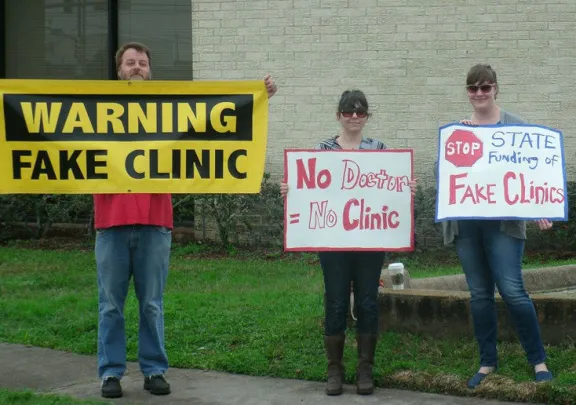
This Date in UCSF History: Crisis Pregnancy Centers Push Anti-Choice Ideals
Originally published in Synapse on May 25, 2006. Recently, a young woman, accompanied by her boyfriend and mother for support, went to visit a Planned Parenthood clinic.
Unwittingly, they entered a Crisis Pregnancy Center (CPC) sharing the same parking lot. The 17-year-old pregnant girl spoke to staff at this CPC and believed she was making an appointment for an abortion at the center next door.
When she later arrived for her “appointment,” she was met by police officers who were responding to claims by the CPC that a minor was being forced to have an abortion against her will.
The CPC staff had also contacted the girl’s father and classmates, urging them to talk her out of the abortion.
This is a shockingly true story from Indiana. What is a Crisis Pregnancy Center? CPCs trace their roots back to the days before Roe v. Wade, when some states began liberalizing their abortion laws.
Typically, these centers are operated by churches or religious organizations and offer alternatives to abortion. The staff at these centers are often volunteers, with no professional or medical training.
They emphasize natural family planning methods and often fail to provide contraceptive or abortive options. Abstinence is presented as the only method to prevent pregnancy when advising unmarried women.
Anti-abortion groups estimate that there are 2,500 to 4,000 of these centers nationwide, outnumbering legitimate health clinics providing abortions by at least six to one.
Although there are a few CPCs providing unbiased information, many are pushing anti-abortion agendas. These CPCs often attract clients with free pregnancy tests.
The wait for test results can be as long as one hour, during which the client is left in the waiting room to watch misleading films and pictures of mutilated fetuses and stillborn babies, surrounded by antiabortion propaganda.
Women are often told that abortions can result in permanent physical and psychological damage.
One woman was told that an abortion would lead to sterility, another told that abortion increases the risk of breast cancer.
Some CPCs have strategically set up offices in the same building as — or nearby — a reproductive clinic offering the full range of services.
Federal, state and local governments are subsidizing the anti-abortion agendas of these centers. CPCs are funded in part by federal abstinence-only education grants, supporting programs that ban any discussion of contraceptives.
The “Choose Life” license plate program has proved lucrative in fundraising for the CPCs, which are now beginning to provide sex education for our children in public schools, a frightening thought.
For example, Pennsylvania takes half of every dollar designated for women’s health services and distributes it to CPCs.
Thankfully, action is being taken to prevent these centers from falsely advertising themselves as providers of family planning or medical services. Representative Carolyn Maloney (D-New York) recently introduced the Stop Deceptive Advertising for Women’s Services (SDAWS) Act.
She was joined by 11 co-sponsors (from NY, CA, IL, AZ, OH, FL, VT, MA) in presenting the legislation on March 30, 2006.
This act would require the Federal Trade Commission (FTC) to enforce truth-in-advertising standards for reproductive centers.
The act directs the FTC to “create rules that prohibit any organization from advertising services with the intent to deceive the public into believing that the organization is a provider of abortion services if it does not, in fact, provide abortion services.”
The centers can be found in small and large cities alike, as well as on the Internet. Do not be fooled by these misleading pregnancy counseling or help centers.
Every woman deserves to have a comprehensive list of reproductive options presented and available to her.
More importantly, as health professionals we need to be aware of where we are referring patients.
It is our duty to ensure that our patients will not be subject to any underlying agendas and will be treated with their personal best interests in mind.



